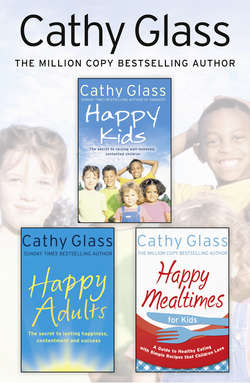Читать книгу Cathy Glass 3-Book Self-Help Collection - Cathy Glass, Cathy Glass - Страница 29
Regression
ОглавлениеAlthough this is a very exciting time for your child, with so many possibilities and expectations it can also be a very frightening time. Apart from simply leaving toddlerhood behind, nursery and preschool, there may also be a new baby in the house. Often at this age a child will revert to less mature behaviour – whining, or asking for the return of a bottle, a pacifier or even a nappy, all of which were dispensed with some time before.
It is up to you how you deal with a minor and short-term regression. Do what you feel comfortable with, but be careful not to over-indulge the regressed behaviour, as it might become a habit that could be difficult to break. I don’t see a problem in letting a four- or five-year-old try a bottle again as long as it’s a fun activity, where you talk to your child about how sucking on the bottle feels, and how great it is that he or she no longer needs a bottle and can drink from a ‘grown-up’ cup and use a knife and fork. However, I would never indulge a child’s whining or tantrums as part of regressed behaviour, and I wouldn’t recommend putting a nappy on a child of this age (when they are dry) or returning a pacifier that is no longer needed.
If your child suddenly, genuinely and dramatically regresses in his or her development and behaviour on all levels, view it as a warning sign that something is wrong. If a child is very anxious about something, there is a comfort in returning to a ‘baby state’ where he or she had no responsibility and had all his or her needs simply by crying. If there is no apparent reason for the regression, such as a new baby, then talk to your child and try to find out what is troubling him or her. Obviously give lots of reassurance, whatever the reason, and if the regression persists for months and impacts on the child’s life, seek medical advice.
I sometimes foster children of this age and older (seven, eight and nine) who regress on all levels when they first come into care. Often these children have never had a childhood, played or gone through the developmental milestones, because they had adult responsibilities and concerns thrust upon them. They have raised themselves and looked after the house, often because their parents were too drink and drug dependent to do the job, so there was never any time or opportunity for the child to be a child; often these children know how to cook and clean, make up babies’ bottles, wind babies and change nappies (from raising their younger siblings). It is so very sad, for they have no idea how to play.
When they come into care and are finally relieved of the huge and inappropriate burden they have carried all their lives, they can regress dramatically in the first few months. An eight-year-old will return to crawling rather than walking, eating with his fingers, wanting a dummy or bottle, baby talking, wetting and soiling himself, and generally acting like a toddler. I allow much of the child’s regressed behaviour in the first few months, as they settle in and begin to adjust to the new environment and feel safe. It can be quite unsettling to have a sturdy nine-year-old boy crawling on all fours, babbling baby talk and wanting to be picked up and carried like a baby. However, I know from experience that the child will gradually work through the developmental stages he or she previously missed, and will catch up again.
Such behaviour underlines just how important these early developmental stages are for children, particularly the time to be a child and play. If deprived of childhood, then given the opportunity, the child instinctively sets about working through these stages before they can go forward and develop. If a child is permanently deprived of a childhood and never given the opportunity to catch up, it can produce emotional and psychological problems in adulthood. Some therapy encourages regression, with the therapist helping the adult client to feel and work through these early years’ stages.
